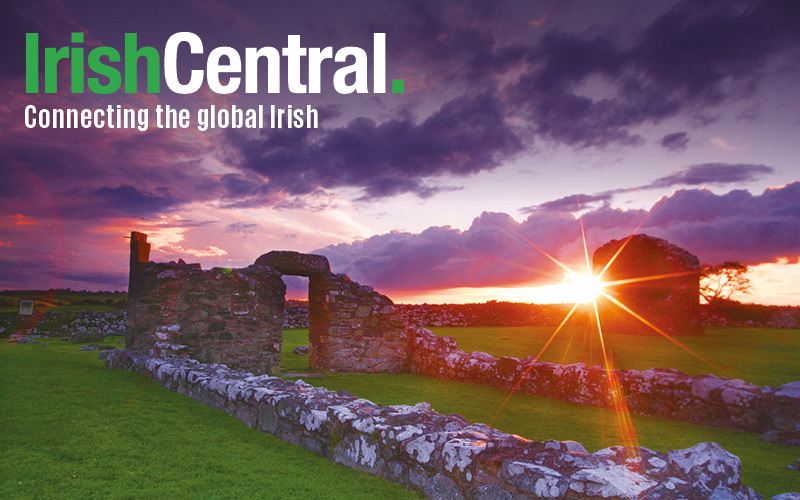Published Wednesday, December 9, 2009, 2:30 PM
The weather was gray and damp, but only a little liquid sunshine fell on the day that a prince of folk music was being laid to rest on the first Monday of December.
As the assembled family and friends sang “The Parting Glass” and “Wild Mountain Thyme” --staples of the Clancy Brothers and Tommy Makem in happier times when closing out so many wonderful concerts -- the remains of Liam Clancy were being hoisted into his grave in An Rinn, the Waterford Gaeltacht where he made his home until his passing last Friday, December , the age of 74 from pulmonary fibrosis.
The sky brightened and a rainbow arched over the Bay at Dungarvan seemingly as far as his native Tipperary. One of the Clancy women turned to Shakespeare for inspiration, not unlike the famed foursome would in concert and remarked, “When beggars die there are no comets seen; the heavens themselves blaze forth the death of princes” from Julius Caesar.
A sign from above perhaps that Clancy’s roving days on earth were now over but only just beginning as he was reunited with his brothers Tom, Pat and Bobby in some celestial dwelling place.
Earlier this past Monday, down the road in St. Mary’s Church in Dungarvan, a capacity throng filled the pews for the funeral Mass attended by the extended Clancy family from near and far led by Liam’s widow, Kim, and his children Eben, Donal, Sean, Siobhan and Fiona.
He had been waked at home, being brought to the church for the service celebrated by the Ring parish priest Father Conchuir O’Ceallaigh.
The offertory gifts included his signature ivory-colored cap, concertina and a copy of W.B. Yeats book of poetry, worn by years of perusing and using in his act so spontaneously.
Son Donal Clancy interrupted a tour with his group Danu in California to make the sad journey home after his father’s passing in Bon Secours Hospital in Cork.
Family friends, poet Michael Coady and Shay Healy, offered more literary and personal reflections to the memorial, with Coady reciting Tennyson’s “Crossing the Bar” and Healy giving the traditional oration after the Mass.
In attendance were Irish government representatives along with many musicians like Paddy Reilly, Finbar Furey, Liam O’Maonlai, Robbie O’Connell, Finbarr and Aoife Clancy and many more too numerous to mention here.
A post-graveside repast at the Park Hotel in Dungarvan was attended by a couple of hundred people, and you can be sure that many a song was sung and a tune played in Mooney’s Pub as well into the early hours, one of Liam’s favorite haunts in better days.
The details above were provided by David Teevan, who worked as a manager for Liam Clancy, and Sean Laffey, the editor of Irish Music Magazine, in phone conversations after the services which they attended, and the Irish Times newspaper from Tuesday, December 8.
It was a fitting and dignified sendoff for Clancy, whose storied life and career will be fondly remembered and talked about for long after we are gone.
His legacy and that of his brothers and Tommy Makem was truly historic, and it would be hard to imagine where the world of Irish music in the public arena would be without them.
In all the latest attention paid to Clancy as the proverbial “last man standing” marking the end of an era with his passing, I just don’t share that finality at all because the force that he and his brothers and Makem unleashed half a century ago can never really be contained or forgotten.
Think of all the festivals, concerts, ballad sessions and sing-songs that we have all attended in that 50-year span, and tell me that we don’t have the swashbuckling Aran jumper-wearing thespian performers to acknowledge for giving us a pride and sense of joy over a heritage that was as simple as it was rich.
Granted the Clancys were more opportunistic than visionary when they rose out of the Greenwich Village Folk Music Scene in the early sixties, where singing songs with bravado and humor paid more than equity acting gigs.
Being natural entertainers with a flair for the dramatic did them no harm when the Ed Sullivan Show came calling, and they created a nationwide stir and swelling of pride in Irish America in 1961 when their 15 minutes of fame turned into a lucrative career.
They rode that wave as long as they could until they went their separate ways, and their impact was monumental in opening doors to Irish music acts around the world and especially in America.
Their commercial success and popularity opened doors for even hardcore traditional music acts like the Chieftains, Planxty, De Danann and the Bothy Band. They offered their experience and encouragement down through the years so that groups like Cherish the Ladies and Danu were feeling the helping hand behind them.“They helped our careers in so many ways, taking us on tour and Irish music cruises and later as our Cherish the Ladies Act succeeded on its own, they recorded with us and never took any money for it,” Joanie Madden told me when recalling Liam Clancy’s kindness.




Comments